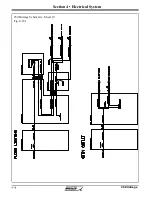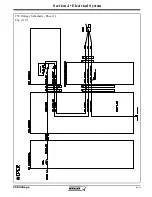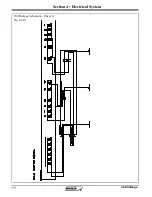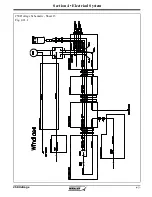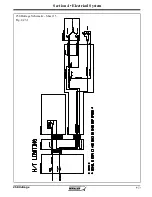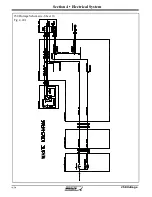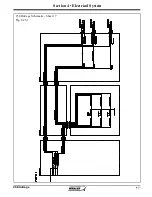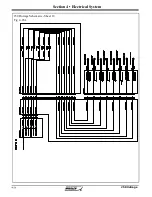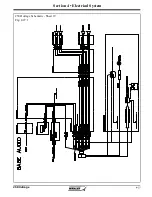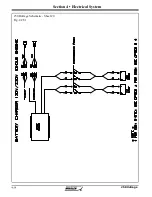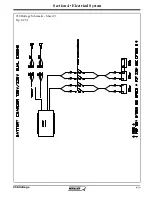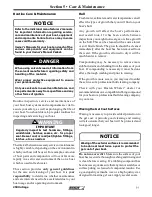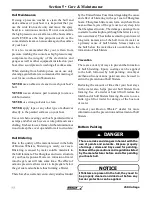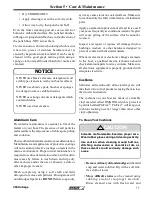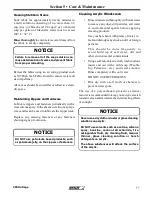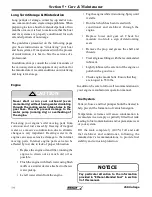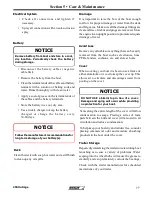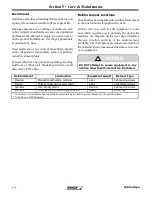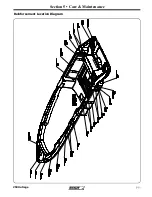
Section 5 • Care & Maintenance
250 Outrage
Hull Maintenance
If using a pressure washer to clean the hull and
deck surfaces of your boat it is important that you
use the wide fan nozzle only and move the spray
head in a continuous motion. Do not concentrate
the high pressure on a small area of the boat surface
and NEVER use the fi ne pinpoint nozzle as the
concentrated stream can cause damage to the surface
of your boat.
It is also recommended that your refrain from
pressure washing the console as high pressure may
compromise the integrity of the electronics and
gauges as well as other equipment installed on your
boat. Also avoid pressure washing all caulk seams.
When staining from build-up does occur, use only
cleaning agents that are recommended for marine gel
coat for use on those stubborn stains.
NEVER
use an abrasive cleaner to wash your boat’s
hull.
NEVER
use an abrasive pad to attempt to remove
stubborn stains.
NEVER
use strong solvents to clean.
NEVER
apply tape or any other type of adhesives
directly to the painted surfaces on your boat.
Use care when covering your boat’s painted surfaces
as tarps and other such covers can trap dirt and cause
chafi ng. It is best to use a frame of either aluminum or
wood to keep the cover up and allow air to circulate.
Hull Blistering
Due to the quality of the materials used in the hulls
of Boston Whalers, blistering is rarely ever seen.
Blistering is caused by water soluble materials in
the hull laminate. The fi berglass and resin structure
of your boat is porous. However, intrusion of water
into the gel coat will take some time. The eff ect of
osmotic pressure allows water to impregnate below
the gel coat and substrate thus forming a blister.
There have been extensive university studies funded
Bottom Painting
There are risks and dangers inherent with the
use of paints and solvents. Dispose properly
of all rags, rollers and trays used for painting.
Follow all the precautions and regulations listed
by the manufacturer before and after painting
your boats hull.
DANGER
NOTICE
If blisters are present in the hull, they need to
be properly cleaned and dried out before any
barrier protection can be applied.
by the United States Coast Guard regarding the cause
and eff ect of blistering in the gel coat of fi berglass
boats. Fiberglass blisters can form anywhere from
near-surface layers of the gel coat to very deep into
the fi berglass structure. The damage can range from
cosmetic to catastrophic, (although the latter is a very
rare occurrence). The studies seemed to point toward
long term immersion of the hull in warm water as
a primary cause of hull blisters. Stress cracks on
the hull below the waterline also contribute to the
formation of hull blisters.
Prevention
There are a variety of ways to prevent the formation
of hull blistering. Epoxy coatings can be applied
to the hull, followed by hull painting. An alkyd-
urethane-silicone marine paint can also be used to
aid in the prevention of hull blisters.
Reducing the amount of time that your boat stays
in the water also helps prevent hull blisters from
forming. Use of a trailer or boat lift will reduce the
likelihood of hull blisters forming. Be sure to use a
bunk type lift or trailer for storage of the boat out
of water.
Contact your Boston Whaler
®
dealer for more
information on the prevention and treatment of hull
blisters.
Summary of Contents for 250 OUTRAGE
Page 1: ...i R 250 Outrage 250 Outrage ...
Page 2: ...ii R ...
Page 18: ...xviii î ï ð ñ ò ó ô õ ö R ø ù ú û ü ý þ ÿ ú ø ÿ ø ú ý ÿ ø ý ...
Page 42: ...1 24 Ë Ì Í Î Ï Ð Ñ Ò Ó Ô R Õ Ö Ø Ù Ú Û Ü Ý Õ Ü Ý Õ Þ Ý Ú ß ß à ß Ü á Õ â ß Ú Ý ã ...
Page 54: ...2 12 w x y z R ª ª ª ª ª ª ª ª ª µ ª º ª º µ ...
Page 72: ...2 30 µ R º À À Á À Â Ã À Ä ...
Page 111: ...250 Outrage Section 4 Electrical System 250 Outrage Schematic Sheet 1 Fig 4 9 1 ...
Page 112: ...250 Outrage Section 4 Electrical System 250 Outrage Schematic Sheet 2 Fig 4 10 1 ...
Page 113: ...250 Outrage Section 4 Electrical System 250 Outrage Schematic Sheet 3 Fig 4 11 1 ...
Page 114: ...250 Outrage Section 4 Electrical System 250 Outrage Schematic Sheet 4 Fig 4 12 1 ...
Page 115: ...250 Outrage Section 4 Electrical System 250 Outrage Schematic Sheet 5 Fig 4 13 1 ...
Page 116: ...250 Outrage Section 4 Electrical System 250 Outrage Schematic Sheet 6 Fig 4 14 1 ...
Page 117: ...250 Outrage Section 4 Electrical System 250 Outrage Schematic Sheet 7 Fig 4 15 1 ...
Page 118: ...250 Outrage Section 4 Electrical System 250 Outrage Schematic Sheet 8 Fig 4 16 1 ...
Page 119: ...250 Outrage Section 4 Electrical System 250 Outrage Schematic Sheet 9 Fig 4 17 1 ...
Page 120: ...250 Outrage Section 4 Electrical System 250 Outrage Schematic Sheet 10 Fig 4 18 1 ...
Page 121: ...250 Outrage Section 4 Electrical System 250 Outrage Schematic Sheet 11 Fig 4 19 1 ...
Page 122: ...250 Outrage Section 4 Electrical System 250 Outrage Schematic Sheet 12 Fig 4 20 1 ...
Page 123: ...250 Outrage Section 4 Electrical System 250 Outrage Schematic Sheet 13 Fig 4 21 1 ...
Page 124: ...250 Outrage Section 4 Electrical System 250 Outrage Schematic Sheet 14 Fig 4 22 1 ...
Page 125: ...250 Outrage Section 4 Electrical System 250 Outrage Schematic Sheet 15 Fig 4 23 1 ...
Page 126: ...250 Outrage Section 4 Electrical System 250 Outrage Schematic Sheet 16 Fig 4 24 1 ...
Page 127: ...250 Outrage Section 4 Electrical System 250 Outrage Schematic Sheet 17 Fig 4 25 1 ...
Page 128: ...250 Outrage Section 4 Electrical System 250 Outrage Schematic Sheet 18 Fig 4 26 1 ...
Page 129: ...250 Outrage Section 4 Electrical System 250 Outrage Schematic Sheet 19 Fig 4 27 1 ...
Page 130: ...250 Outrage Section 4 Electrical System 250 Outrage Schematic Sheet 20 Fig 4 28 1 ...
Page 131: ...250 Outrage Section 4 Electrical System 250 Outrage Schematic Sheet 21 Fig 4 29 1 ...
Page 132: ...250 Outrage Section 4 Electrical System THIS PAGE INTENTIONALLY LEFT BLANK ...
Page 143: ...Section 5 Care Maintenance 250 Outrage Reinforcement Location Diagram ...

